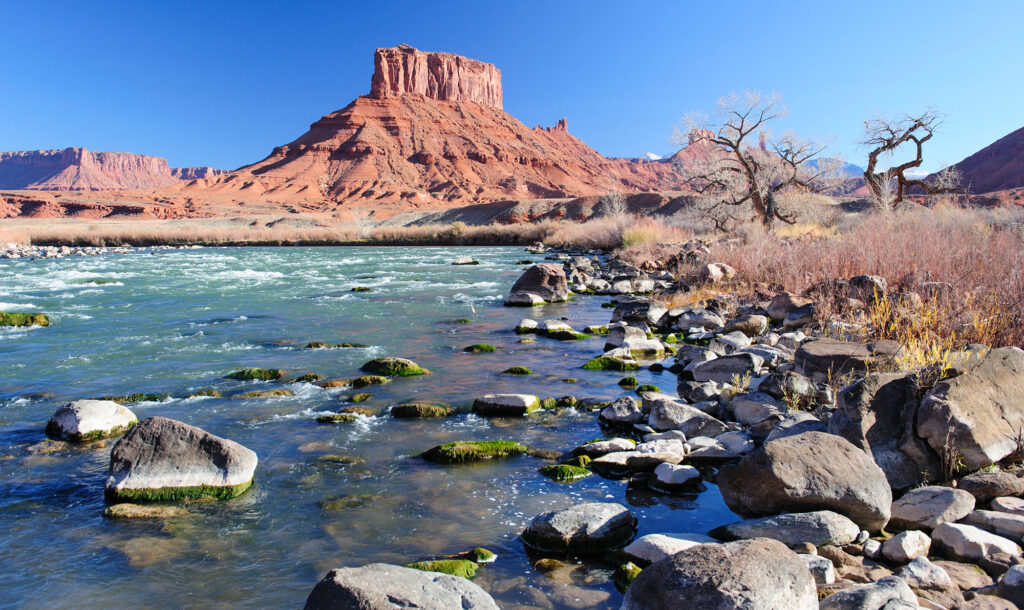
The Water Desk launched in April 2019 with support from a two-year, $700,000 grant from the Walton Family Foundation.
In 2021, we received a new, two-year $600,000 grant from the foundation, and in 2023, we received a new, two-year $900,000 grant from the foundation.
A $150,000 grant from the S. D. Bechtel, Jr. Foundation supported our work in 2020. We also received a $10,000 gift from Bill and Barbara Burgess in 2020 and a $5,000 gift in 2021. In 2021, we received a $50,000 grant from the Thornburg Foundation, and in 2022, we received a $50,000 matching grant from the Water Funder Initiative to support our work in New Mexico and the Rio Grande Basin. In 2022, this project also received an additional $25,000 grant from the Thornburg Foundation and a $25,000 grant from the Santa Fe Community Foundation. In 2024, we were awarded a $50,000 grant from the Thornburg Foundation to support our New Mexico and Rio Grande program. We have also received smaller individual donations from individuals as well as matching funds from NewsMatch.
As a journalistic effort, the Water Desk maintains a strict editorial firewall between its content and funders. Likewise, The Water Desk has editorial independence from the University of Colorado.
Our funders cannot specify how The Water Desk and its partners cover a story, nor can they influence the outcome of that reporting. The Water Desk’s grantmaking program for journalists also has an editorial firewall: funders have no right of review and no influence on stories or other journalistic content that is produced with the support of these grants.
The Water Desk abides by the norms outlined in the Society of Professional Journalists Code of Ethics. SPJ’s code is based on the following principles:
- Seek truth and report it: Ethical journalism should be accurate and fair. Journalists should be honest and courageous in gathering, reporting and interpreting information.
- Minimize harm: Ethical journalism treats sources, subjects, colleagues and members of the public as human beings deserving of respect.
- Act independently: The highest and primary obligation of ethical journalism is to serve the public.
- Be accountable and transparent: Ethical journalism means taking responsibility for one’s work and explaining one’s decisions to the public.
The Water Desk is a member of the Institute for Nonprofit News. We’ve based our policies on editorial independence and donor transparency on INN’s ethics and practices policies.
The Water Desk shares the University of Colorado’s commitment to diversity, equity, inclusion and community engagement. The University of Colorado Boulder exemplifies excellence through diversity by:
- Creating a welcoming and inclusive environment
- Maximizing the success and inclusion of all students, staff and faculty
- Engaging with diverse perspectives through a growth mindset
Editorial independence policy
Our organization retains full authority over editorial content to protect the best journalistic and business interests of our organization. We maintain a firewall between news coverage decisions and sources of all revenue. Acceptance of financial support does not constitute implied or actual endorsement of donors or their products, services or opinions.
We accept gifts, grants and sponsorships from individuals and organizations for the general support of our activities, but our news judgments are made independently and not on the basis of donor support.
Our organization may consider donations to support the coverage of particular topics, but our organization maintains editorial control of the coverage. We will cede no right of review or influence of editorial content, nor of unauthorized distribution of editorial content.
Our organization will make public all donors who give a total of $5,000 or more per year. We will accept anonymous donations for general support only if it is clear that sufficient safeguards have been put into place that the expenditure of that donation is made independently by our organization and in compliance with INN’s Membership Standards.
Donor transparency
We are committed to transparency in every aspect of funding our organization.
Accepting financial support does not mean we endorse donors or their products, services or opinions.
We accept gifts, grants and sponsorships from individuals, organizations and foundations to help with our general operations, coverage of specific topics, and special projects. Our news judgments are made independently – not based on or influenced by donors. We do not give supporters the rights to assign, review or edit content.
We will make public all donors who give $5,000 or more per year. As a nonprofit, we will avoid accepting donations from anonymous sources, and we will not accept donations from political parties, elected officials or candidates actively seeking public office. We will not accept donations from sources who present a conflict of interest with our work or compromise our independence.
Additional information
Our work with philanthropic funders also has been informed by the work of the American Press Institute, which has published guidance on the issue.
The Water Desk’s director, Mitch Tobin, is a member of the Society of Professional Journalists; the Society of Environmental Journalists; Investigative Reporters and Editors; and the Online News Association.
If you’re interested in supporting The Water Desk, please contact us!


